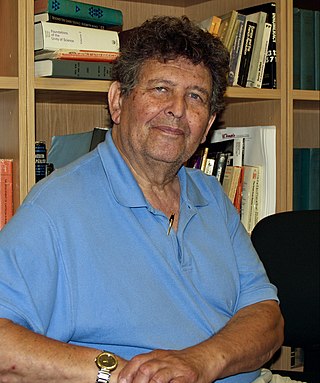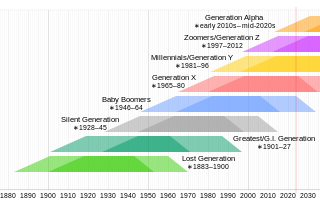Related Research Articles

A social class or social stratum is a grouping of people into a set of hierarchical social categories, the most common being the working class, middle class, and upper class. Membership of a social class can for example be dependent on education, wealth, occupation, income, and belonging to a particular subculture or social network.

A subculture is a group of people within a cultural society that differentiates itself from the values of the conservative, standard or dominant culture to which it belongs, often maintaining some of its founding principles. Subcultures develop their own norms and values regarding cultural, political, and sexual matters. Subcultures are part of society while keeping their specific characteristics intact. Examples of subcultures include BDSM, hippies, hipsters, goths, steampunks, bikers, punks, skinheads, gopnik, hip-hoppers, metalheads, cosplayers, otaku, otherkin, furries, hackers and more. The concept of subcultures was developed in sociology and cultural studies. Subcultures differ from countercultures.

Ethnography is a branch of anthropology and the systematic study of individual cultures. Ethnography explores cultural phenomena from the point of view of the subject of the study. Ethnography is also a type of social research that involves examining the behavior of the participants in a given social situation and understanding the group members' own interpretation of such behavior.
Participant observation is one type of data collection method by practitioner-scholars typically used in qualitative research and ethnography. This type of methodology is employed in many disciplines, particularly anthropology, sociology, communication studies, human geography, and social psychology. Its aim is to gain a close and intimate familiarity with a given group of individuals and their practices through an intensive involvement with people in their cultural environment, usually over an extended period of time.

In criminology, blue-collar crime is any crime committed by an individual from a lower social class as opposed to white-collar crime which is associated with crime committed by someone of a higher-level social class. While blue-collar crime has no official legal classification, it holds to a general net group of crimes. These crimes are primarily small scale, for immediate beneficial gain to the individual or group involved in them. This can also include personal related crimes that can be driven by immediate reaction, such as during fights or confrontations. These crimes include but are not limited to: Narcotic production or distribution, sexual assault, theft, burglary, assault or murder.

This is an index of sociology articles. For a shorter list, see List of basic sociology topics.

In criminology, subcultural theory emerged from the work of the Chicago School on gangs and developed through the symbolic interactionism school into a set of theories arguing that certain groups or subcultures in society have values and attitudes that are conducive to crime and violence. The primary focus is on juvenile delinquency because theorists believe that if this pattern of offending can be understood and controlled, it will break the transition from teenage offender into habitual criminal. Some of the theories are functionalist, assuming that criminal activity is motivated by economic needs, while others posit a social class rationale for deviance.

Stanley Aronowitz was an American sociologist, trade union official, and political activist. A professor of sociology, cultural studies, and urban education at the CUNY Graduate Center, his longtime political activism and cultural criticism was influential in the New Left movement of the 1960s, 1970s, and beyond. He was also an advocate for organized labor and a member of the interim consultative committee of the International Organization for a Participatory Society. In 2012, Aronowitz was awarded the Center for Study of Working Class Life's Lifetime Achievement Award at Stony Brook University.
Sherry Beth Ortner is an American cultural anthropologist and has been a Distinguished Professor of Anthropology at UCLA since 2004.

Sociology is the scientific study of human society that focuses on society, human social behavior, patterns of social relationships, social interaction, and aspects of culture associated with everyday life. Regarded as a part of both the social sciences and humanities, sociology uses various methods of empirical investigation and critical analysis to develop a body of knowledge about social order and social change. Sociological subject matter ranges from micro-level analyses of individual interaction and agency to macro-level analyses of social systems and social structure. Applied sociological research may be applied directly to social policy and welfare, whereas theoretical approaches may focus on the understanding of social processes and phenomenological method.

Robert Roberts was an English teacher, writer and social historian, who penned evocative accounts of his working-class youth in The Classic Slum (1971) and A Ragged Schooling (1976).
Máirtín Mac an Ghaill is a social and educational theorist. He is the author of The Making of Men: Masculinities, Sexualities and Schooling, The RoutledgeFalmer Reader in Gender and Education (ed), Education and Masculinities and Contemporary Racisms and Ethnicities.

Theory of generations is a theory posed by Karl Mannheim in his 1928 essay, "Das Problem der Generationen," and translated into English in 1952 as "The Problem of Generations." This essay has been described as "the most systematic and fully developed" and even "the seminal theoretical treatment of generations as a sociological phenomenon". According to Mannheim, people are significantly influenced by the socio-historical environment of their youth; giving rise, on the basis of shared experience, to social cohorts that in their turn influence events that shape future generations. Because of the historical context in which Mannheim wrote, some critics contend that the theory of generations centers on Western ideas and lacks a broader cultural understanding. Others argue that the theory of generations should be global in scope, due to the increasingly globalized nature of contemporary society.
Cultural deprivation is a theory in sociology where a person has inferior norms, values, skills and knowledge. The theory states that people of lower social classes experience cultural deprivation compared with those above and that this disadvantages them, as a result of which the gap between classes increases.
Professor Phillip Brown FLSW, a British sociologist of education, economy and social change, is Distinguished Research Professor in the School of Social Sciences at Cardiff University. He is a prominent modern sociologist and currently the author of seventeen books and over 100 articles and reports. Since 2005 he has given keynote presentation in over 17 counties around the world, including the World Bank in Washington and International Labour Organization in Geneva and EU in Brussels.
Cultural studies is a politically engaged postdisciplinary academic field that explores the dynamics of especially contemporary culture and its social and historical foundations. Cultural studies researchers generally investigate how cultural practices relate to wider systems of power associated with, or operating through, social phenomena. These include ideology, class structures, national formations, ethnicity, sexual orientation, gender, and generation. Employing cultural analysis, cultural studies views cultures not as fixed, bounded, stable, and discrete entities, but rather as constantly interacting and changing sets of practices and processes. The field of cultural studies encompasses a range of theoretical and methodological perspectives and practices. Although distinct from the discipline of cultural anthropology and the interdisciplinary field of ethnic studies, cultural studies draws upon and has contributed to each of these fields.

Learning to Labour: How Working Class Kids Get Working Class Jobs is a 1977 book on education, written by British social scientist and cultural theorist Paul Willis. A Columbia University Press edition, titled the "Morningside Edition," was published in the United States shortly after its reception.
Richard Jenkins is a sociologist and retired academic. From 1995 to 2014, he was Chair in Sociology at the University of Sheffield.

Phil Cohen (1943-2024) was a British cultural theorist, urban ethnographer, community activist, educationalist and poet. He was involved in the London underground counter-culture scene and gained public notoriety as "Dr John", a leader in the squatter's rights movement but is now better known for his work on youth culture and the impact of urban regeneration on working-class communities, particularly in East London, with a focus on issues of race and popular racism. More recently the scope of his work has widened to includes issues of identity politics, memory and loss, and the future of the Left in Britain. His most recent writing and research focuses on the transformation of object relations within digital capitalism, especially in relation to the Covid-19 pandemic and the environmental crisis.Most recently (2023) he has embarked on a series of collaborative book projects with graphic artists. Cohen's academic work is trans-disciplinary and draws on concepts from linguistics and narratology, psycho-analysis and anthropology, cultural history and social phenomenology. He is currently (2024) Emeritus Professor at the Centre for Cultural Studies at the University of East London, and a member of the Livingmaps Network which he founded in 2013.Cohen is also a member of Compass, a Gramscian think tank within the Labour Party and is on the editorial board of New Formations. His work has been translated into French, German, Swedish, Italian, French and Japanese.

Hooligans or Rebels? An Oral History of Working-Class Childhood and Youth, 1889–1939 is a 1981 sociology book written by Stephen Humphries and published by Basil Blackwell.
References
- ↑ Willis, Paul (1984). "Youth Unemployment-A New Social State". New Society. 67: 475. Retrieved 9 August 2015.
- 1 2 3 Sassateli, Roberta. Marco Santoro, Paul Willils. "An Interview With Paul Willis: Commodification, Resistance, and Reproduction." European Journal of Social Theory 2009 12: 265. doi : 10.1177/1368431009106205. Sage Publications. http://www.sagepublications.com
- ↑ Taylor, L. & Taylor, I. (eds) (1972) Politics and Deviance, Harmondsworth: Penguin pg.213
- ↑ Willis, Paul E. (24 August 2014). Profane Culture. ISBN 9780691163697.
- ↑ "Princeton Anthropology - Overview". Archived from the original on 26 May 2010.
- ↑ "Ethnography". 29 October 2015.
- ↑ "Prof Paul Willis".
- ↑ Hechter, Michael. Christine Horne. Theories of Social Order: Paul Willis Learning to Labor. Stanford, California: the Board of Trustees of the Leland Stanford Junior University, 2009.
- 1 2 Kleijer, Henk. Ger Tillekens. "Twenty-five years of Learning to Labour-Looking back at British cultural studies with Paul Willis". Soundscapes.info. 5 February 2003. http://www.icce.rug.nl/~soundscapes/VOLUME05/Paul_WillisUK.shtml Archived 22 November 2017 at the Wayback Machine
- 1 2 McFarland, Joan; Cole, Mike (1988). "An Englishman's Home Is His Castle? A Response to Paul Willis's 'Unemployment: The Final Inequality'". British Journal of Sociology of Education. 9 (2): 199–203. ISSN 0142-5692.
- ↑ Walker, J. C. (1986). "Romanticising Resistance, Romanticising Culture: Problems in Willis's Theory of Cultural Production". British Journal of Sociology of Education. 7 (1): 59–80. ISSN 0142-5692.